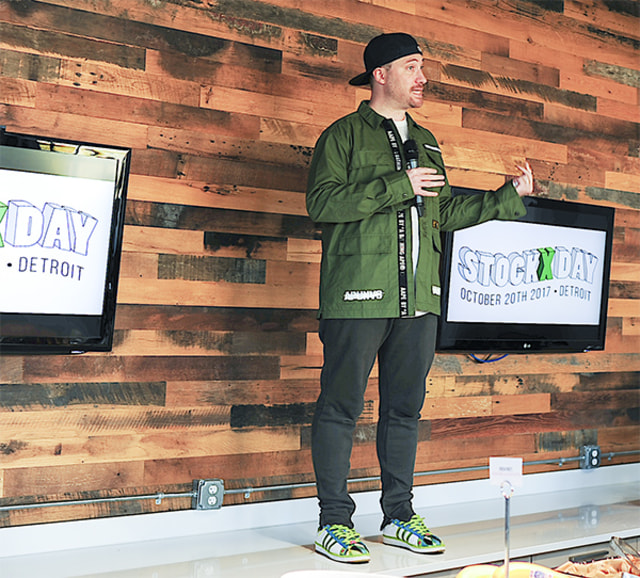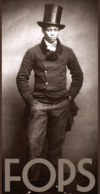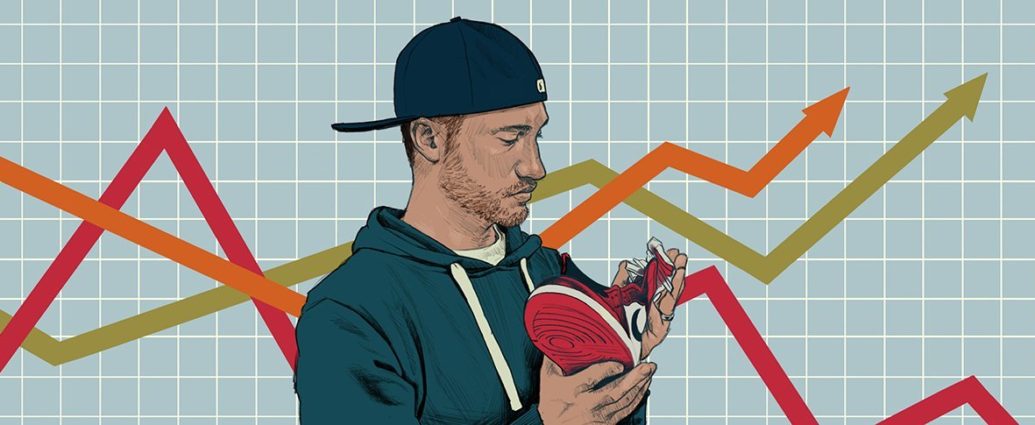The Founder of StockX Turned His Hobby Into a Billion-Dollar Business in 3 Years. Then He Turned Over the Reins. Now What?
Josh Luber built sneaker marketplace StockX to be a ‘stock market of things.’ It worked. Then, he got replaced and decided to stick around.

When Josh Luber, co-founder of StockX, was in the sixth grade, he started his first business: selling Bubblicious to his classmates. Covertly, because they weren’t allowed to chew gum in school.
“It was a great business,” he says. “Good margins. I used to hop the fence behind my house, go to the Acme grocery store, and buy four packs of gum for $1. Each pack had five pieces, and I could sell them for a quarter apiece.”
Like a lot of ’80s and ’90s kids, Luber also idolized Michael Jordan. He was 6 years old when Nike released the first Air Jordans, and begging his mom for a pair became a constant refrain. (Her answer: a constant no.) Post-college, after cashing a few paychecks from his furniture-store job, he went to Foot Locker and dropped $125 on a pair of Air Jordan 11 Concords: white fabric tops, shiny black middles, undulating taupe soles.
The sneakers were more than a fashion statement. For Luber, that purchase commenced a quest to understand and capitalize on the economics of the $130 billion universe of sneakers, particularly those that are released in limited quantity, usually ones designed in collaboration with zeitgeisty athletes or musicians.
Almost two decades later, Luber sits in a corner office at the downtown Detroit headquarters of StockX, the resale marketplace he co-founded in 2015, which has grown from a fantastical idea about building a “stock market of things” to a company of nearly 1,000 employees, valued at more than $1 billion. Thanks to the internet, sneakerhead culture has grown from local networks of hobbyists into a booming global business. Driven by collectors who see rare sneakers as investment assets or a way to make a quick buck–by, say, flipping a pair of sold-out $125 sneakers for three times that much–the market for resale sneakers and streetwear in North America is estimated to be $2 billion, according to the investment firm Cowen, and projected to reach $6 billion by 2025.
Luber, 41, looks like a skateboarder who got airdropped into an office. He wears baseball caps, ripped T-shirts, and hoodies. His office is a shrine to the ’90s-era touchstones that defined his youth: The surface of his desk is inlaid with Ken Griffey Jr. baseball cards and dotted with figurines (Bart Simpson in one corner, Homer in another). Two matte-black metal shelves display rows of like-new sneakers, a rotating gallery culled from Luber’s collection of more than 400 pairs.
He points to a pair of vermilion mesh high-tops–Yeezy Red Octobers, the last design Kanye West produced for Nike before moving to Adidas. “That’s probably the most expensive shoe here. They’re around $5,000, but I haven’t worn them,” he says. “They’re technically the company’s. If I wear them, I have to pay for them.”

Those are the rules at StockX. But the thing is, Luber no longer makes them. After serving as the company’s chief executive and public face for over three years, he lost his CEO title in June. That’s when Scott Cutler, who previously helped steer eBay, StubHub, and the New York Stock Exchange, took over.
For many founders, the prospect of giving up control is the stuff that fuels nightmares. Once, everyone in the company reported to Luber, and it was his vision, in large part, that propelled the company to where it is today. Now “basically no one” reports to him, he says–though he does develop new lines of business. And he’s still StockX’s face; he still travels the world talking it up. In a way, it’s a dream job: With no strict agenda, he can geek out on new shoes and baseball cards more than ever. He can show up late. But is this what a born hustler dreams about?
From the start, a big part of Luber’s job was simply explaining what StockX is. Part eBay, part Amazon, the company is an online catalog of collectible sneakers, streetwear, handbags, watches, and tchotchkes that, like the stock market, allows buyers and sellers to determine the price of every product. The company deploys a double auction strategy, which allows buyers to place bids–the maximum they’re willing to pay–and sellers to place asks–the minimum at which they’re willing to sell. If the bid is at least as high as the ask, then the transaction is executed. StockX takes a commission of 9.5 to 14.5 percent from each sale, and in 2019 it brokered over $1 billion worth of transactions.

Consistency is key. Unlike eBay, where one pair of Air Jordans might appear with a photo of the shoes in the box and another might appear with the shoes next to a cat, StockX maintains a single listing page for every sneaker model it sells. It’s the difference between looking for couches on Craigslist and looking for them on Crate & Barrel. The company’s 100-plus authenticators scrutinize products in more than a dozen ways–including a smell test–to ensure their legitimacy. Fakes abound in the sneaker world, and the StockX tag of authenticity is so respected that the factories churning out fakes now make counterfeit “certified by StockX” tags as well.
StockX deals only with unworn sneakers, which means that a pair of Nikes purchased through StockX should arrive in their original box, as pristine as they’d be if purchased new from Foot Locker. Except that the craze around limited-edition sneakers has escalated to the point that it’s not easy to get them from Foot Locker or any traditional retailer. On release day, lines snake out of stores, and many of the people waiting are proxies for others, or flippers. For the sneaker companies, of course, that scarcity is intentional. As Luber puts it, “They understand that if they make one more pair, they might sell 10 fewer”–not to mention sacrifice all the hype. What Luber recognized was that, when supply is artificially low, retail price becomes arbitrary, since it’s not based on true supply-and-demand dynamics. “If a shoe that retails for $150 is worth $1,000 on our site, there’s no need for the concept of retail price,” Luber says. “There’s only market price.”

On the one hand, Luber’s concept is limited to working only in select product categories–“high-value, non- commodity goods,” in the words of University of California, Berkeley, economics professor Steve Tadelis. “It’s not scalable.” But the volume of merchandise being bought and sold on StockX shows no signs of slowing down. And having proved that the stock-market-of-things concept is at least viable, this past January the company began to experiment with an ingenious expansion: original products developed for and sold exclusively on StockX. Its first IPO (initial product offering), a pair of slides created by the celebrity jeweler Ben Baller, sold for between $181 and $260. StockX’s second IPO, three pairs of sneakers designed with Adidas, went on sale in October. “By 2021, it should be, every Monday, here are the five IPOs happening this week,” Luber says. These IPOs, he believes, are the future of e-commerce.
It was 2012 when Luber started noodling with the idea that would become StockX. After getting law and business degrees at Emory University, he’d started two companies–a Geek Squad-like service that he ended up selling and an online employee-management service that failed–and then landed a job with IBM in New York City. Not exactly the wingtip-wearing corporate type, he started working on projects on the side. One of them was called Campless, an online Kelley Blue Book for sneakers that tracked resale prices on eBay. It was the first database of its kind, and as he built it up, emails and tweets from fellow data enthusiasts and sneakerheads poured in offering help. By 2015, Luber had amassed a volunteer army of website contributors. He would stay up until 4 a.m. working on Campless and report for duty at IBM five hours later.
He had no idea at the time, but he had a fan in a billionaire 600 miles away. Dan Gilbert, the Detroit-based co-founder of Quicken Loans and owner of the Cleveland Cavaliers, had noticed that his teenage sons were spending a lot of time on eBay, bidding on sneakers. He brought this up to Greg Schwartz, who founded a calendar app that Gilbert had invested in. “He started talking about the mechanics of stock markets–why they’re more efficient and powerful than auctions like eBay or consignment,” recalls Schwartz. “Then he said, ‘I think the first category could be sneakers.’ I thought he was joking.”

Gilbert eventually convinced Schwartz that the “stock market of things” could be a thing, and Schwartz convinced Gilbert that they needed a true sneakerhead at the helm. “There’s no way we can launch this if the person running the company is wearing loafers,” he told Gilbert.
Luber had talked with a lot of companies that wanted to use Campless’s data by the time Gilbert and Schwartz called, in March 2015. The conversations never went anywhere, and he braced himself for more of the same. But the morning after this call, Gilbert and Schwartz offered to fly him out to a Cavaliers game to continue the conversation. “I really didn’t think much of it,” Luber recalls. “But go to a game with the owner of the Cavs? Absolutely.”
Luber’s wife was 39 weeks pregnant. His plan was to fly to Cleveland in the morning, go to the 3 p.m. game, and fly back to Philadelphia, where he and his wife lived, that night. He brought with him a piece of paper laying out his grand vision for Campless, the same printout he’d brought to all of his previous meetings. It explained how a sneaker price guide could incentivize users to create sneaker portfolios, like stock portfolios, and the logic of establishing a stock market for sneakers. He showed it to Schwartz and Gilbert after the game. They stared back at him, dumbfounded. “We’ve got to get you to Detroit,” Schwartz said.
Luber texted his wife, “Please don’t go into labor.” He texted his boss at IBM, “Not showing up at work tomorrow, sorry.” One day bled into the next, and the trio still needed more time. Luber texted his wife again, “Please don’t kill me.” He wore the same clothes for three days. He got home at 1 a.m. on Tuesday night, his wife waiting up for him. “Hey, I think we’re moving to Detroit,” he said.
She gave birth three days later. (“It was our second kid,” Luber says. “I don’t think I would’ve done it with our first.”) Gilbert and Schwartz acquired Campless within two months, and StockX launched in February 2016 with all three men as co-founders.
When you start a company and you have a billionaire co-founder, it changes a lot,” says Luber. (Gilbert, who is recovering from a stroke, was unable to comment for this story.) “Greg and I didn’t have to spend half of our lives out there fundraising. We could focus on the actual business.” Luber and Schwartz knew they were on to something that September, when Nike rereleased a popular pair of Air Jordan 1’s and the volume of products being sold through StockX went from 50 per day to 300.
The founders decided to seek outside investment in 2017. One of the people they approached was Scott Cutler, who was then the CEO of StubHub, the secondary market for tickets, and was already acting as an informal adviser to StockX. Back in 2016, the day StockX issued its first press release, Cutler had sent a LinkedIn message to Luber detailing his executive experience at StubHub, eBay, and NYSE. “I think this is a really big idea, and I’d love to help,” he wrote.
Luber saw the message and went straight to Schwartz. He was concerned because StubHub is owned by eBay, and they viewed eBay as their primary competition. “Is he a spy?” Luber asked. But Schwartz reasoned that a conversation with an undisputed expert in secondary markets couldn’t hurt, so Luber scheduled a video call. Luber and Cutler got along well enough that they arranged to meet the following week in Toronto. “It was casual. We were just getting to know each other,” Luber says. “I met his wife. I met one of his kids.”
Tall and trim, with close-cropped gray hair, Cutler looks like the type of guy who does triathlons for fun. His diplomatic and jargon-heavy way of speaking testifies to his years at corporate headquarters. He and Luber began talking on the phone every month, batting around ideas. “Every conversation was a deep one,” says Cutler. “It would go down tunnels: how limit orders work, how derivatives work, pools of liquidity, multichannel environments.” Luber would run ideas by Cutler. What should StockX’s second authentication center look like? How would a product IPO work?

In 2017, Cutler’s son interned at StockX. When Cutler went to visit him in Detroit, it was the first time he set foot in the company’s office. “I saw the seeds of what this could look like at scale,” he says. Fast-forward to March 2019, when Cutler found himself on the job market. The company was now flipping thousands of pairs of shoes per day, and the staff had ballooned in the previous two years. His talks with StockX escalated. Meanwhile, he turned down CEO roles at public companies, he says, because he wanted to steer a startup.
Luber likes to say that it just so happened that StockX announced its billion-dollar valuation (based on a $110 million Series C investment this past June) and Cutler’s appointment as CEO at the same time. But to hear it from Cutler, you couldn’t have had one without the other. “I knew pretty much every investor in the latest round,” he says. As investors were mulling whether to go in, Cutler answered their questions. “It was very transparent that I was seriously considering this role,” he says.
Meanwhile, StockX was outgrowing Luber’s capacity as a manager–and his interests. Important initiatives were stalling. The company needed to fill key roles, such as chief financial officer, and Luber wasn’t focused on executive search. He was often out of town on the conference circuit. Schwartz and Gilbert stopped waiting for him to weigh in before making certain decisions. Cutler made the hires soon after he started.
On a recent Tuesday afternoon, the new CEO breezes into the office wearing a gray sweater with elbow patches and a pair of Nike high-tops with the plastic tag still attached. (“It’s a personal preference,” he says; his former preference was Gucci loafers.) He occupies the office next to Luber’s–smaller, not a corner–and flies to Detroit from the Bay Area every week.
In this CEO-founder dance, Cutler and Luber have managed to not step on each other’s toes with a simple division of labor. Luber handles partnerships, IPOs, new product categories, and public speaking; Cutler handles everything else.
The only time I see Cutler and Luber interact in the office is when Luber ambles over to Cutler’s office at one point, blue baseball cap on backward, red manila folder in hand, and leans against the glass door, nodding and talking for a few minutes before returning to his hype cave. Save for a visitor or two, he spends the afternoon alternately staring at his monitor and unboxing shoes. He seems siloed. And maybe a little lonely.
Around 4:30, the lights are out in Luber’s office. Has he gone home? “Oh, no, he’s taking a nap,” says his assistant. “He takes 11-minute naps. Once, he locked the door and forgot to set his alarm.”
Luber starts and ends most days in the shoe room of his colonial-style home in an affluent, leafy suburb. “This is part of the reason we got the house,” he says, opening the door to an alcove-roofed space that contains approximately $100,000 worth of sneakers–more than 400 pairs arrayed along sleek, backlighted shelves. “I was like, ‘I need a room for my shoes.’ The best thing for me is to think of what shoes I want to wear before I go to the office.” His eyes pan across the shelves.
He can afford to spend more time in here now that he’s removed from many of the operational details that Cutler oversees: scaling StockX in Europe and Asia, hiring C-suite types, working out the complicated logistics of shipping to customers in more than 200 countries. He can spend more time on the things that truly excite him, like baseball cards. This fall, StockX launched trading cards as a category. Luber thinks they might be better for the company than sneakers.
There are 12 packs of cards on the poker table in the center of his sneaker room; the previous night, Luber stayed up until 4 a.m. sorting through them, trying to find the rookie card of Frank Thomas, a five-time All-Star designated hitter. “If it’s in the right condition, it’s worth 150 bucks,” he says. “On average, if I get two of these, and then a handful of these”–he holds up a card that’s worth less but still worth something–“I’m getting maybe $400 worth of value out of a box that I paid $100 for.” It’s not just a hobby, he says–scouring eBay and trading card shops also helps him figure out their inefficiencies, so StockX can do better. He used to stay up until 4 a.m. answering email. He prefers this. He’s doing fine, he swears.
StockX said the company does not publicly comment on contracts, salaries, or how long employees need to stay on to have their shares vest. (Luber, along with Schwartz, is StockX’s largest employee shareholder.) Everyone, Luber included, toes the party line about how his involvement is crucial to StockX’s continued growth. If he has to be here, indulging his obsessions is a fine way to do it. Better that than the headaches of large-scale management. “Before StockX, the most people at a company I ever worked at, other than IBM, was 12,” Luber says, “and half of them were contractors. I’m way more comfortable and effective at the founding stage than with the day-to-day. I’m a startup guy. I’m a startup founder.”
He mulls over what shoes to wear. There’ll be a dinner with the board of directors tonight, and a board meeting tomorrow. He’s running 15 minutes late. He rubs his eyes. He doesn’t seem stressed or nervous. He seems like he’s hustled enough, for now.
Correction: An earlier version of this article misstated the city to which Josh Luber planned to fly back after flying to Cleveland for a Cavaliers game with Dan Gilbert. It was Philadelphia.



